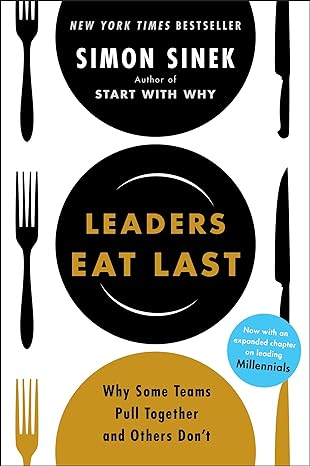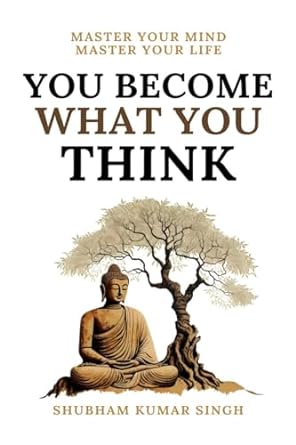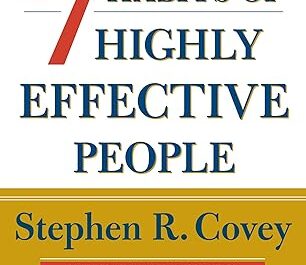Leaders Eat Last by Simon Sinek explores the concept of leadership centered around trust, empathy, and putting the well-being of others first. Sinek argues that great leaders create environments where team members feel safe and valued, which in turn fosters loyalty, collaboration, and long-term success. By prioritizing the needs of their team, leaders can build strong, resilient organizations where everyone thrives. The book offers insights on how to cultivate a culture of trust and lead with empathy in both personal and professional settings.

“Leaders Eat Last” by Simon Sinek explores how great leaders create environments where people naturally work together, trust each other, and willingly go the extra mile. Here’s a summary of the 25 key points from the book:
1. Leaders’ Responsibility
– True leadership isn’t about being in charge; it’s about taking care of those in your charge. Leaders are responsible for creating a safe environment for their team.
2. The Circle of Safety
– Leaders should create a “Circle of Safety” that protects their people from external threats, enabling them to focus on collective goals.
3. Chemical Drivers of Behavior
– Human behavior is driven by chemicals like dopamine, serotonin, endorphins, and oxytocin, which encourage collaboration, trust, and a sense of belonging.
4. Endorphins and Dopamine
– Endorphins mask pain, allowing us to push our limits, while dopamine drives us to achieve goals and seek rewards.
5. Serotonin and Oxytocin
– Serotonin reinforces relationships and status within a group, while oxytocin fosters trust and bonding, essential for teamwork.
6. Cortisol: The Stress Hormone
– Cortisol is released in response to stress, leading to a fight or flight response. Chronic stress harms trust, creativity, and overall well-being.
7. Leadership Requires Sacrifice
– Leaders must be willing to sacrifice their comfort and personal interests for the benefit of the group, putting others’ needs first.
8. Empathy is Key
– Empathy allows leaders to understand the needs, concerns, and emotions of their people, fostering trust and loyalty.
9. Trust is Earned
– Trust is built over time through consistent behavior, honesty, and care. It cannot be demanded or bought.
10. The Importance of Belonging
– People perform best when they feel they belong to a group that values them. Leaders should create a strong sense of belonging.
11. The Dangers of Selfish Leadership
– When leaders prioritize their interests over their people, it breeds distrust, insecurity, and disengagement.
12. The Impact of Cortisol on Teams
– High levels of cortisol from constant stress lead to fear, anxiety, and reduced teamwork, harming organizational culture.
13. Leaders Set the Tone
– The behavior of leaders sets the tone for the entire organization. Their actions and decisions ripple through the group.
14. The Power of Vulnerability
– Leaders who show vulnerability build deeper connections with their team, fostering trust and open communication.
15. Service-Oriented Leadership
– Leaders should serve their people by removing obstacles, providing resources, and helping them grow and succeed.
16. Long-Term Vision
– Effective leaders focus on long-term goals rather than short-term gains, building a sustainable and resilient organization.
17. The Infinite Game
– Leadership is about playing the “infinite game” where the goal is not to win, but to keep the game going, ensuring continuous growth and improvement.
18. The Role of Culture
– A strong, positive culture is crucial for an organization’s success. Leaders must actively cultivate and protect it.
19. The Danger of Disconnected Leadership
– Leaders who are disconnected from their people and the frontline realities make poor decisions and erode trust.
20. The Influence of Authority
– Authority does not equate to leadership. True leaders inspire and influence others through respect, not command.
21. Leadership is a Choice
– Leadership is not a rank or position; it’s a choice to care for and serve others.
22. Building Trust Through Communication
– Open, honest, and frequent communication builds trust and ensures everyone is aligned and informed.
23. Recognizing Contributions
– Leaders should recognize and appreciate the contributions of their people, which boosts morale and reinforces positive behavior.
24. The Role of Leaders in Crisis
– In times of crisis, leaders must remain calm, provide clear direction, and prioritize the well-being of their people.
25. Leaders Eat Last
– The title metaphor: Leaders put the needs of their people before their own, much like how great military leaders eat last, ensuring their troops are fed first.


